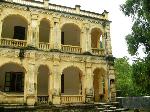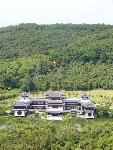- Getting around Lijiang. Dont stay in the Old Towns more than 2 days, there is nothing to do. KRISS Oct 9, 2013 05:46
- 2013 Beijing Temple Fair BENNYLAU Feb 26, 2013 03:29
- Malaysian traveling from KUL - LAX vis Shanghai PVG ZATI_DY Jan 3, 2013 20:15
Return to China
- Views: 4157
- |Vote: 1 1
- |Add to Favorites
- |Recommend to Friends
Back Through the Friendship Gate
Tropical Vietnam was thickly overlaid with swollen clouds, visibly pregnant with their rain. I was heading north for the Chinese border once again, blood giddy with the syrupy black coffee I'd been served at the lakeside in Hanoi, eager to cross the border once again and return to the land I've come to consider home.
It was already late in the day by the time I arrived at the Friendship Gate - the stone arch set in the mountain pass that divides China from its southern neighbour - and there were few travellers crossing with me; a couple of language students of both nationalities taking this the cheapest option to cross the border. Most travellers using this pass take an international train, which is not only three times more expensive than taking a series of connecting busses, but which also involves lengthy customs delays, as the whole trainfull of passengers are processed at border stations on both sides.
Guangxi, by far one of China's loveliest provinces, made for a friendly welcome back to the PRC. Cruising into Pingxiang town for my transport north in a bumpy taxivan (which I'd successfully negotiated the fair price of RMB20 for) China's rural stone homes were set in sad collections on the surrounding slopes, standing in austere contrast tothe skinny, lemon yellow effeminate structures common in Vietnam. Visitors arriving from the south will immediately feel the transition from the mellow, tropical smiles of Vietnam to the overbearing sense of tired burden that is said to lie hidden in every Chinese heart. This is perhaps the legacy of an old, embattled culture that expresses itself at times in very dark, subtle ways - but that is generally perceived by visitors to China as a uniting factor as China struggles to rise out of the quagmire of its past, as being part of the slow motor of progress that you can feel in the strong, quiet eyes of men and women all over the land. China's muscles are taut and aching; only in China have I felt so much history and loss in a welcoming gaze. It's what always draws me back.
When I'd passed through Pingxiang to leave China on my last trip out, I'd failed to realise how developed and interesting the city is. I'd had the impression that it was somewhat poor and remote, a mere outpost significant only as a stage for entering or leaving: but as I was driven through the broad avenues heading for the long distance bus station I was surprised to see a town that was evidently thriving on cross-border trade. Pingxiang's central district is relaxed and prosperous, attractively designed and eminently comfortable. My taxi crossed a stone bridge set across a peaceful stream flowing brightly through the town, a sweet embellishment on what is a lovely city.
I stopped at the long distance bus station and found the ticket office to purchase my ongoing ticket. I'd been told previously that the station only had services to Nanning, but was surprised to find that there are busses headed for destinations all over Guangxi, including the tropical beach city of Beihai where I was hoping to visit next. There were also overnight services to neighbouring Guangdong Province, with busses marked for Guangzhou and Shenzhen on the border with Hong Kong. However, I was unlucky to have arrived just 20 minutes after the service to Beihai had departed, and so instead opted for a ticket to the provincial capital, Nanning, where I was sure I could head for Beihai conveniently.
I had a couple of hours left to wander around the city. The quiet streets were densely populated with businesses selling goods imported from Vietnam (and elsewhere) as well as Chinese brands catering for the Vietnamese market. In the half-light of late evening, most of the townspeople seemed to be in a local public square, the young and the elderly dancing old-style routines, a pocket of cultural elegance in China's extreme southern border region.
I stopped to eat and afterwards couldn't help but sample another nuclear-strength Vietnamese coffee in a small, nicely decorated cafe near the bus station - at only RMB6, it was sure to be the last pure coffee bean taste I could expect on my trip back to Beijing. It was so good I almost considered staying the night in Pingxiang so I could have another cup in the morning. I'd heard prices in Pingxiang for accommodation were crippling: however, a threadbare but acceptable hotel in a charming building next to the station, the Yindu, offered me a bed for a hundred yuan that I reluctantly declined.
Return to the Green City
Perhaps it was the coffee that kept me wired on the three hour trip to Nanning, but I couldn't help feeling excited as the bus made its rapid expedition north. Nanning was a city I had taken an immediate liking to when passing through on my journey south, and this had also come as something of a surprise. It's far from China's most famous destination, but during these years of being overlooked, the local administration has been working on some large-scale beautification projects that have taken what was already a charming city and made of it a place that looks even more spectacular. My signal for having arrived at last was to spot from the window a gigantic crimson lotus flower constructed on the roadside near the long-distance station I was arriving at: each petal is an individual structure illuminated from within, spaced apart at regular intervals so that they appear to be part of the same blossom from a distance.
I hopped into a taxi to get me into central Nanning - and sat marvelling at the procession of lights along the arterial Minzu Dadao, a several-lane roadway running straight through the main districts of the city. Almost every building is lined with neon side lights that trace each straight edge; spotlights are everywhere and hotels are lit up like palaces. If Nanning is the city of green in the daylight hours, it is the city of lights in the night time, and it makes a far more striking impression on new visitors than does crusty old Beijing or pretentious Shanghai.
I'd stayed in a crummy railside hotel during my last visit - this time I checked in to a classier joint across the way called the Milky Way that turned out to be only RMB18 more expensive than the smelly RMB120 room I'd had before. The Milky Way (Yin He) has a lobby that almost makes it look like a five star hotel - although the rooms are definitively three star - but my 17th floor view couldn't give me any cause to complain. I watched silently as the lights of Nanning slowly extinguished themselves, one by one, until I finally beat down the caffeine and fell asleep.
I've written about Nanning before and I'd not planned to write about the city again, but I couldn't help but feel a great deal of enthusiasm for the place, and I was compelled to remain there for a couple more days. Once again I visited the enormous Qingxiushan reserve, this time feasting on the strange local fruit and visiting the Guanyin Zen Temple, which although still under construction is starting to look most impressive. I made an easy climb of the Phoenix Pagoda, which offers a comprehensive view of Nanning and of the surrounding Guangxi countryside, a view that is far better than that seen from the taller Dragon Elephant Pagoda, which stands in a far lower region of the park.
I spent a lot of time wandering the easy market streets around lower Chaoyang Road, in particular the Minsheng Lu pedestrian mall, where fashionable clothes shops are open in old, classical buildings - and in a district that boasts an unusually dense congestion of McDonald's restaurants. I also enjoyed the palm-lined public parks along the Yong Riverside, where citizens of Nanning seemed to be strolling with a self-satisfied air. Despite the fact that living in Beijing has brought me so many opportunities, I seriously considered giving up my wearisome lifestyle there in such a busy and polluted city, and relocating here.
But the call of the road ahead made itself felt once again, and after a particularly unhealthy but delicious and cheap meal of fried noodles, which I'd enjoyed in the outdoor stalls across from the train station, I went inside and booked my RMB40 ticket to beachside Beihai. Early the next afternoon I would find myself back on the iron rails again, heading through broad flatlands of verdant pastures, bound for a view of the blue sea and the tropical silver sands of the Beibu Gulf. All reports of the city of Beihai, Guangxi's port destination with ferry connections to Guangzhou, Haikou and Vietnam's Halong Bay, spoke highly of this place - seldom visited by foreign tourists - and I was keen to establish for myself just how well the city lived up to its reputation as a destination on a par with Hainan, China's Hawaii. Happily, my travels in China were quickly taking on a very tropical
theme.





 Copyright © 1998-2026 All rights reserved.
Copyright © 1998-2026 All rights reserved.